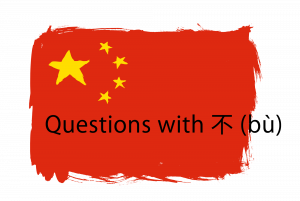Difference between revisions of "Language/Mandarin-chinese/Grammar/Questions-with-不-(bù)"
(Created page with "Closed interrogative questions in Chinese can also be formulated with 不 (bù). This is done by adding an affirmative-negative structure at the end of the sentence. ==Struc...") |
m (Quick edit) |
||
| (15 intermediate revisions by 3 users not shown) | |||
| Line 1: | Line 1: | ||
Closed interrogative questions in Chinese can also be formulated with 不 (bù). | [[File:Questions with 不 (bù).png|thumb]] | ||
Closed interrogative questions in Chinese can also be formulated with <span class="notranslate">不 (bù)</span>. | |||
This is done by adding an affirmative-negative structure at the end of the sentence. | This is done by adding an affirmative-negative structure at the end of the sentence. | ||
| Line 5: | Line 7: | ||
==Structure== | ==Structure== | ||
<code>Verb + 不 + Verb</code> | <code>Verb + <span class="notranslate">不</span> + Verb</code> | ||
<code><span class="notranslate">好 不 好 ?</span></code> | |||
<code><span class="notranslate">對 不 對 ?/对 不 对 ?</span></code> | |||
<code><span class="notranslate">是 不 是 ?</span></code> | |||
When placed before a falling tone character, <span class="notranslate">不</span> is read <span class="notranslate">bú</span>. | |||
This expression can be attached to the end of a sentence to form a closed interrogative sentence. | This expression can be attached to the end of a sentence to form a closed interrogative sentence. | ||
| Line 11: | Line 21: | ||
Closed interrogative sentences await confirmation or acceptance of what has been said. | Closed interrogative sentences await confirmation or acceptance of what has been said. | ||
In English "isn't it?" or "OK?" are often used for closed interrogative sentences. | In English "isn't it?" or "OK?" are often used for closed interrogative sentences. | ||
==Examples== | ==Examples== | ||
*<span class="notranslate">他們 來 不 來 ?/他们 来 不 来 ? (Tāmen lái bù lái?)</span> | |||
<blockquote>Are they going to come or not?</blockquote> | |||
*我们 去 咖啡 店 , 好 不 好 ? | *<span class="notranslate">你 想 不 想 我 ? (Nǐ xiǎng bù xiǎng wǒ?)</span> | ||
Wǒmen qù kāfēi diàn, hǎo bù hǎo? | <blockquote>Do you or do you not miss me?</blockquote> | ||
*<span class="notranslate">我們 要 去 酒吧 , 你 去 不 去 ?/我们 要 去 酒吧 , 你 去 不 去? (Wǒmen yào qù jiǔbā, nǐ qù bú qù?)</span> | |||
<blockquote>We are going to the bar. Do you want to go?</blockquote> | |||
*<span class="notranslate">我 去 買 咖啡 , 你 要 不 要 ?/我 去 买 咖啡 ,你 要 不 要 ? (Wǒ qù mǎi kāfēi, nǐ yào bú yào?)</span> | |||
<blockquote>I'm going to buy coffee. Do you want some?</blockquote> | |||
*<span class="notranslate">我們 去 咖啡 店 ,好 不 好?/我们 去 咖啡 店 , 好 不 好 ? (Wǒmen qù kāfēi diàn, hǎo bù hǎo?)</span> | |||
<blockquote>Let's go to the cafe, OK?</blockquote> | <blockquote>Let's go to the cafe, OK?</blockquote> | ||
* | *<span class="notranslate">他 是 你 的 老闆 , 對 不 對?/他 是 你 的 老板 , 对 不 对 ? (Tā shì nǐ de lǎobǎn, duì bú duì?)</span> | ||
<blockquote>It's your boss, is not it?</blockquote> | |||
<blockquote> | |||
* | *<span class="notranslate">你 姓 王 , 是 不 是 ? (Nǐ xìng Wáng, shì bù shì?)</span> | ||
<blockquote>Your name is Wang, isn't it?</blockquote> | |||
<blockquote> | |||
==Sources== | ==Sources== | ||
https://chine.in/mandarin/grammaire/ASG4D8XB | https://chine.in/mandarin/grammaire/ASG4D8XB | ||
https://resources.allsetlearning.com/chinese/grammar/Affirmative-negative_question | |||
==Other Lessons== | |||
* [[Language/Mandarin-chinese/Grammar/Be-Polite|Be Polite]] | |||
* [[Language/Mandarin-chinese/Grammar/了-le|了 le]] | |||
* [[Language/Mandarin-chinese/Grammar/Basic-structure-of-a-sentence|Basic structure of a sentence]] | |||
* [[Language/Mandarin-chinese/Grammar/呢-ne|呢 ne]] | |||
* [[Language/Mandarin-chinese/Grammar/Future-Tense|Future Tense]] | |||
* [[Language/Mandarin-chinese/Grammar/吗-ma|吗 ma]] | |||
* [[Language/Mandarin-chinese/Grammar/Describing-People-with-Suffixes-家-者-师-员-生-手|Describing People with Suffixes 家 者 师 员 生 手]] | |||
* [[Language/Mandarin-chinese/Grammar/Conditional-Mood|Conditional Mood]] | |||
* [[Language/Mandarin-chinese/Grammar/Mastering-Chinese-Grammar-Easily-–-8-Rules-You-Need-to-Know|Mastering Chinese Grammar Easily – 8 Rules You Need to Know]] | |||
Latest revision as of 23:11, 26 March 2023
Closed interrogative questions in Chinese can also be formulated with 不 (bù).
This is done by adding an affirmative-negative structure at the end of the sentence.
Structure[edit | edit source]
Verb + 不 + Verb
好 不 好 ?
對 不 對 ?/对 不 对 ?
是 不 是 ?
When placed before a falling tone character, 不 is read bú.
This expression can be attached to the end of a sentence to form a closed interrogative sentence.
Closed interrogative sentences await confirmation or acceptance of what has been said.
In English "isn't it?" or "OK?" are often used for closed interrogative sentences.
Examples[edit | edit source]
- 他們 來 不 來 ?/他们 来 不 来 ? (Tāmen lái bù lái?)
Are they going to come or not?
- 你 想 不 想 我 ? (Nǐ xiǎng bù xiǎng wǒ?)
Do you or do you not miss me?
- 我們 要 去 酒吧 , 你 去 不 去 ?/我们 要 去 酒吧 , 你 去 不 去? (Wǒmen yào qù jiǔbā, nǐ qù bú qù?)
We are going to the bar. Do you want to go?
- 我 去 買 咖啡 , 你 要 不 要 ?/我 去 买 咖啡 ,你 要 不 要 ? (Wǒ qù mǎi kāfēi, nǐ yào bú yào?)
I'm going to buy coffee. Do you want some?
- 我們 去 咖啡 店 ,好 不 好?/我们 去 咖啡 店 , 好 不 好 ? (Wǒmen qù kāfēi diàn, hǎo bù hǎo?)
Let's go to the cafe, OK?
- 他 是 你 的 老闆 , 對 不 對?/他 是 你 的 老板 , 对 不 对 ? (Tā shì nǐ de lǎobǎn, duì bú duì?)
It's your boss, is not it?
- 你 姓 王 , 是 不 是 ? (Nǐ xìng Wáng, shì bù shì?)
Your name is Wang, isn't it?
Sources[edit | edit source]
https://chine.in/mandarin/grammaire/ASG4D8XB
https://resources.allsetlearning.com/chinese/grammar/Affirmative-negative_question
